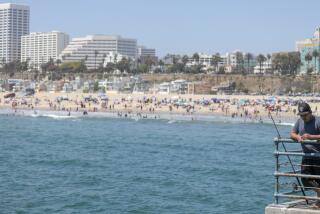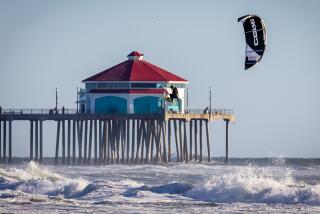‘Yukon Express’ Brings Sprinkles, Chills to County
- Share via
A fast-moving Arctic cold front delivered a grazing blow to Southern California on Saturday before preparing to take a final punch at the Southland tonight.
As it hung around for a second day, the frigid air mass dubbed the “Yukon Express” hammered farmers and ranchers already staggering from last weekend’s record-breaking cold snap.
It was chilly and cloudy in Orange County, with temperatures in the low 50s and dropping to the high 40s along the coastal cities, and a few sprinkles of rain in some areas. Weekend lows in the county were expected to drop to the high 30s. Newport Harbor and Huntington State Beach officials said there was no sign of the record high tides that are expected to peak on Monday.
The cold weather drew the homeless to Orange County’s National Guard armories for the night. Both the Santa Ana and Fullerton armories expected to fill their 125 beds by the end of Saturday night.
Pre-dawn temperatures dipped into the 20s from Bakersfield to Redding, where thermometers hit 22 degrees early Saturday, tying the city’s record low reading for the date. Growers were anxiously inspecting fruit trees and vineyards to determine whether the freeze had killed plants.
Although lows were recorded early Saturday of 50 in Los Angeles, 37 in Lancaster and 27 at Mt. Wilson, ranchers and residents of inland areas were warned to expect colder temperatures tonight.
“Sunday night will be colder than Saturday night,” said Steve Burback, a meteorologist for WeatherData Inc., which provides forecasts for The Times. “There will be a light freeze in the inland areas. The coldest areas will probably be around the upper 20s.”
But warm winds gusting up to 25 m.p.h. will push daytime temperatures into the 60s today, Burback said. The warming trend will continue Monday and New Year’s Day, when a postcard-perfect day is predicted for Pasadena’s Tournament of Roses parade and Rose Bowl football game.
The picture that residents of California’s central San Joaquin Valley awakened to on Saturday was one of ice, however.
“There was ice everywhere, on cars, lawns, trees, streets,” said Lori Segrue, who works at a 900-acre vineyard in Kingsburg. “It’s all people are talking about. It’s affecting everyone.
“People are losing their jobs over it. My husband is a supervisor at an orange-packing house and he’s gone down to forklift driver because the hourly employees are all gone.”
In Clovis, workers at the Loring Citrus Farm toiled all night to keep heaters and wind machines whirring. They flooded their 40-acre orange orchard with 72-degree water pumped “from deep, deep in the ground” and managed once again to save their orange crop, a spokeswoman said Saturday.
But Robert Krauter, a spokesman for the California Farm Bureau, said other growers lost virtually their entire crop to last weekend’s Arctic blast, the worst freeze to hit the state since the 1936-37 growing season.
Only 2% of California’s citrus growers--146 of 7,000--are insured against frost.
There is no estimate yet on total freeze losses to the state’s $8-billion-per-year agriculture crop, although some experts feel damage could total $1 billion. As a result, shoppers will soon see shortages and higher food prices, the experts said.
In Santa Cruz County, Gov. George Deukmejian declared a state of emergency because of freeze damage to public water systems, which local officials were struggling to repair.
Weather forecasters said there were some bright spots on the horizon, however.
For example, today’s wind gusts are expected to disappear by Monday, when an unusually high tide is expected along the Southland coast about 8 a.m.
More to Read
Sign up for Essential California
The most important California stories and recommendations in your inbox every morning.
You may occasionally receive promotional content from the Los Angeles Times.














